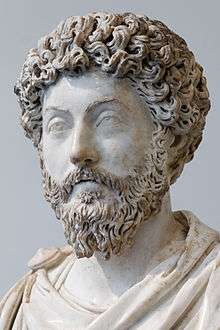Roman philosophy

Ancient Roman philosophy was heavily influenced by the ancient Greeks, in particular, the Stoics and the Epicureans.
Characteristics
Some important figures include Lucretius, Cicero, and his school of eclecticism, and Seneca the younger. Later with the spread of Christianity inside the Roman empire the Christian philosophy of Saint Augustine of Hippo was fundamental.
The Meditations of Roman emperor Marcus Aurelius are still revered as a literary monument to a philosophy of service and duty, describing how to find and preserve equanimity in the midst of conflict by following nature as a source of guidance and inspiration.
Some of the most significant Roman Stoics were Seneca, Cornutus, Musonius Rufus, Euphrates, Cleomedes, Epictetus, Hierocles, Sextus, Junius Rusticus, Marcus Aurelius.
Roman Epicureanism was the philosophy of Amafinius, Rabirius, Titus Albucius, Phaedrus, Philodemus, Lucretius, Patro, Catius, Siro, Diogenes of Oenoanda.
Notable philosophers
Roman times

- Cicero (106 – 43 BCE)
- Lucretius (94 – 55 BCE)
- Seneca (4 BCE – 65 CE)
- Musonius Rufus (30 – 100 CE)
- Marcus Aurelius (121 – 180 CE)
- Clement of Alexandria (150 – 215 CE)
- Alcinous (philosopher) (2nd century CE)
- Sextus Empiricus (3rd century CE)
- Alexander of Aphrodisias (3rd century CE)
- Plotinus (205 – 278CE)
- Porphyry (232 – 304 CE)
- Iamblichus (242 – 327 CE)
- Themistius (317 – 388 CE)
- Augustine of Hippo (354 – 430 CE)
- Damascius (462 – 540 CE)
- Boethius (472 – 524 CE)
- Simplicius of Cilicia (490 – 560 CE)
- John Philoponus (490 – 570 CE)
Early Christian philosophy
See also
Notes
- ↑ The main Sextians were: Sotion, a doxographer and biographer; Papirius Fabianus, a rhetorician and philosopher; Crassicius Pasicles, a grammarian, and Celsius Cornelius, a famous doctor
Further reading
| Library resources about Roman philosophy |
- Farrell, Joseph. 2014. "Philosophy in Vergil." In The Philosophizing Muse: The Influence of Greek Philosophy on Roman Poetry. Edited by Myrto Garani and David Konstan. Newcastle-upon-Tyne: Cambridge Scholars Publ.
- Griffin, Miriam T. 2013. "Latin Philosophy and Roman Law." In Politeia in Greek and Roman Philosophy. Edited by Verity Harte and Melissa Lane, 96-115. Cambridge; New York : Cambridge University Pr.
- Hammer, Dean C. 2014. Roman Political Thought: From Cicero to Augustine. Cambridge; New York: Cambridge University Pr.
- Morford, M. 2002. The Roman Philosophers from the Time of Cato the Censor to the Death of Marcus Aurelius. London and New York: Routledge.
- Powell, J. G. F., ed. 1995. Cicero the Philosopher. Oxford: Clarendon.
- Rawson, E. 1985. Intellectual Life in the Late Roman Republic. Baltimore: Johns Hopkins Univ. Press.
- Star, Christopher. 2015. "Roman Tragedy and Philosophy." In Brill’s Companion to Roman Tragedy. Edited by George William Mallory Harrison. Leiden: Brill.
- Trapp, M. 2007. Philosophy in the Roman Empire: Ethics, Politics and Society. Ashgate, UK: Aldershot.
- Williams, G. D., and K. Volk, eds. 2015. Roman Reflections: Studies in Latin Philosophy. New York: Oxford Univ. Press.
- Volk, K., and G. D. Williams, eds. 2006. Seeing Seneca Whole: Perspectives on Philosophy, Poetry, and Politics. Columbia Studies in the Classical Tradition 28. Leiden, The Netherlands: Brill.